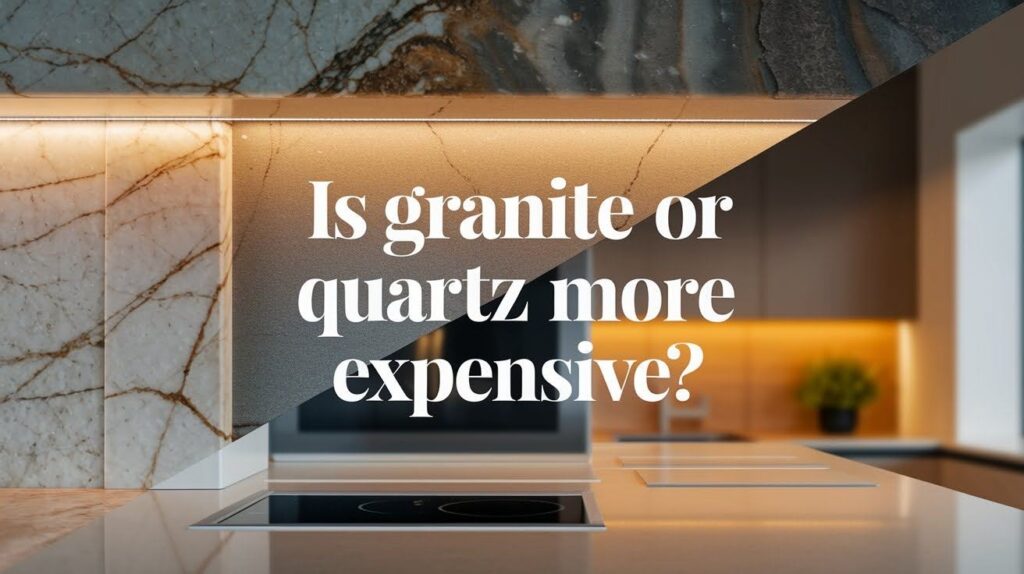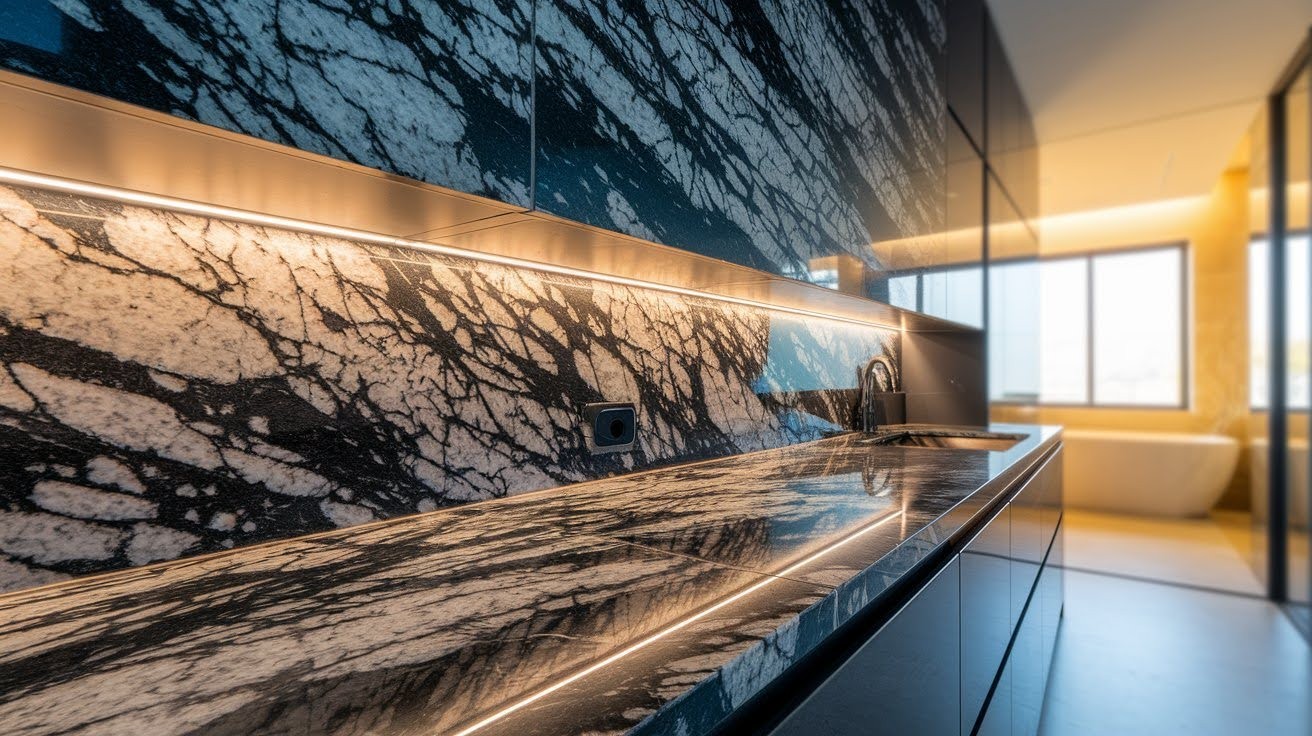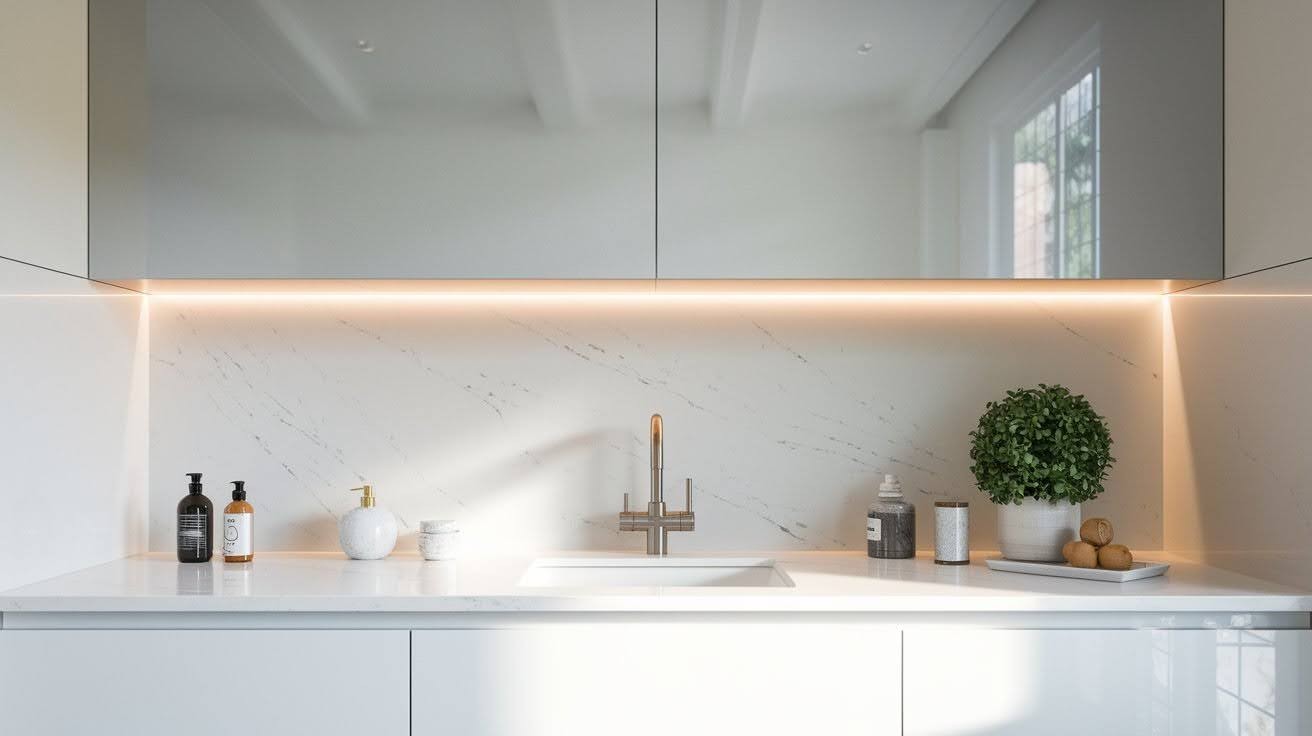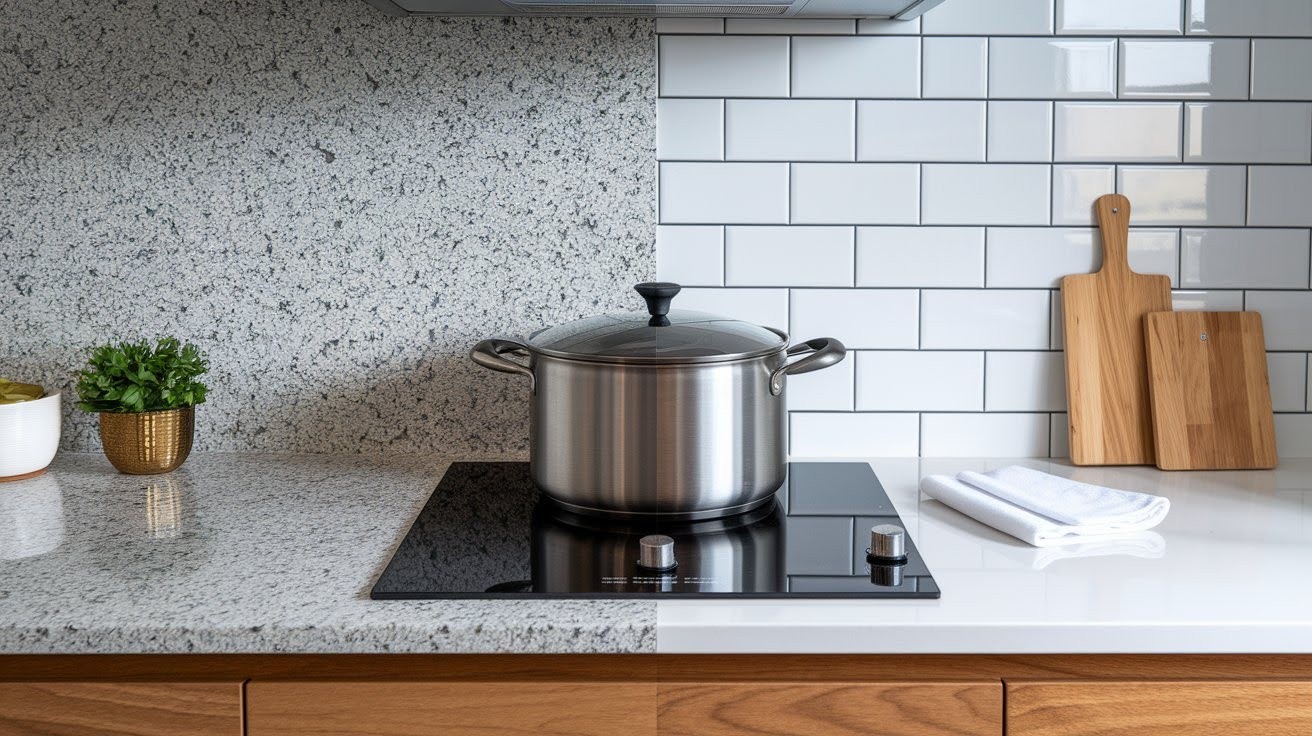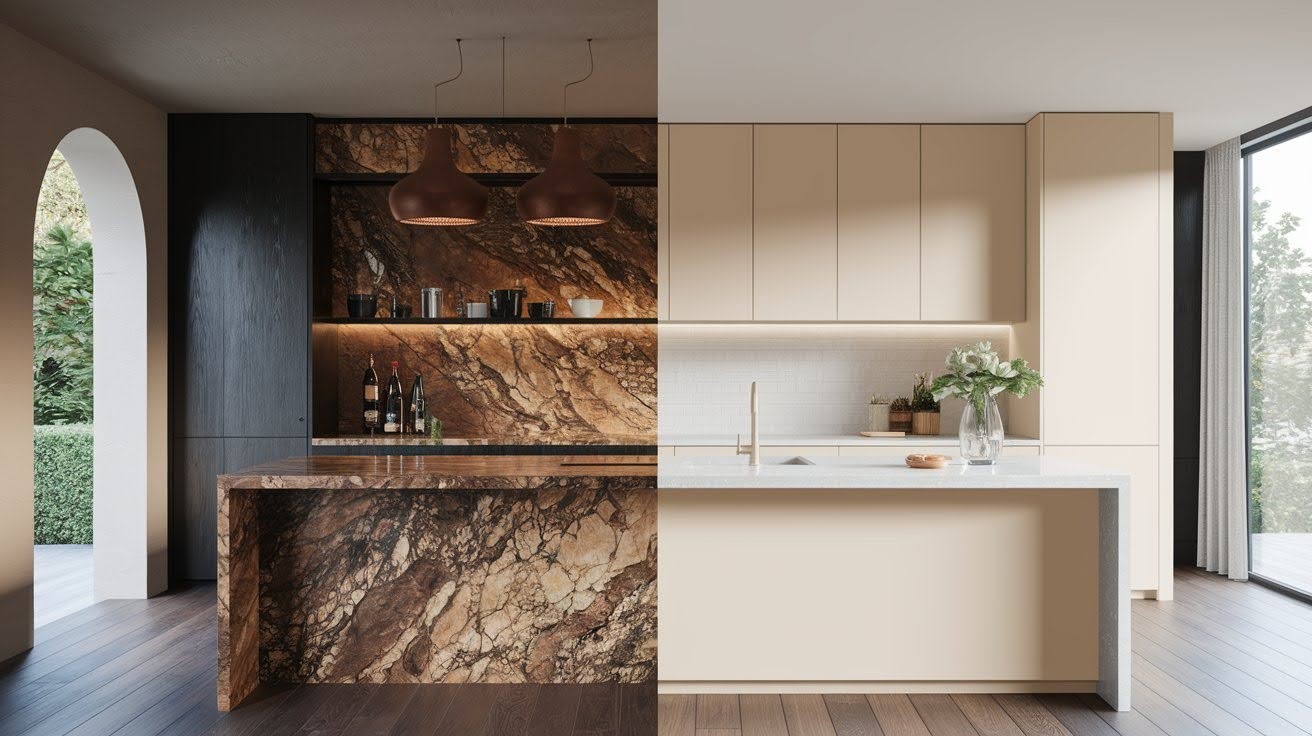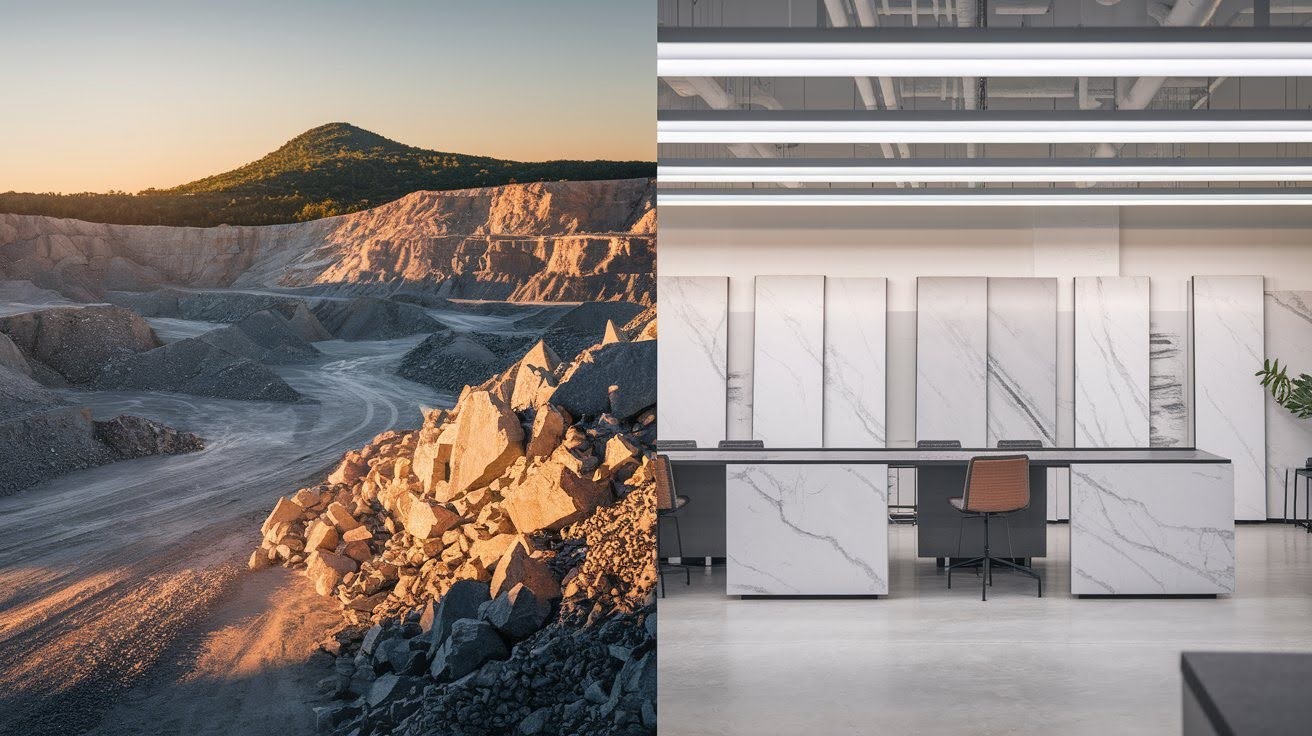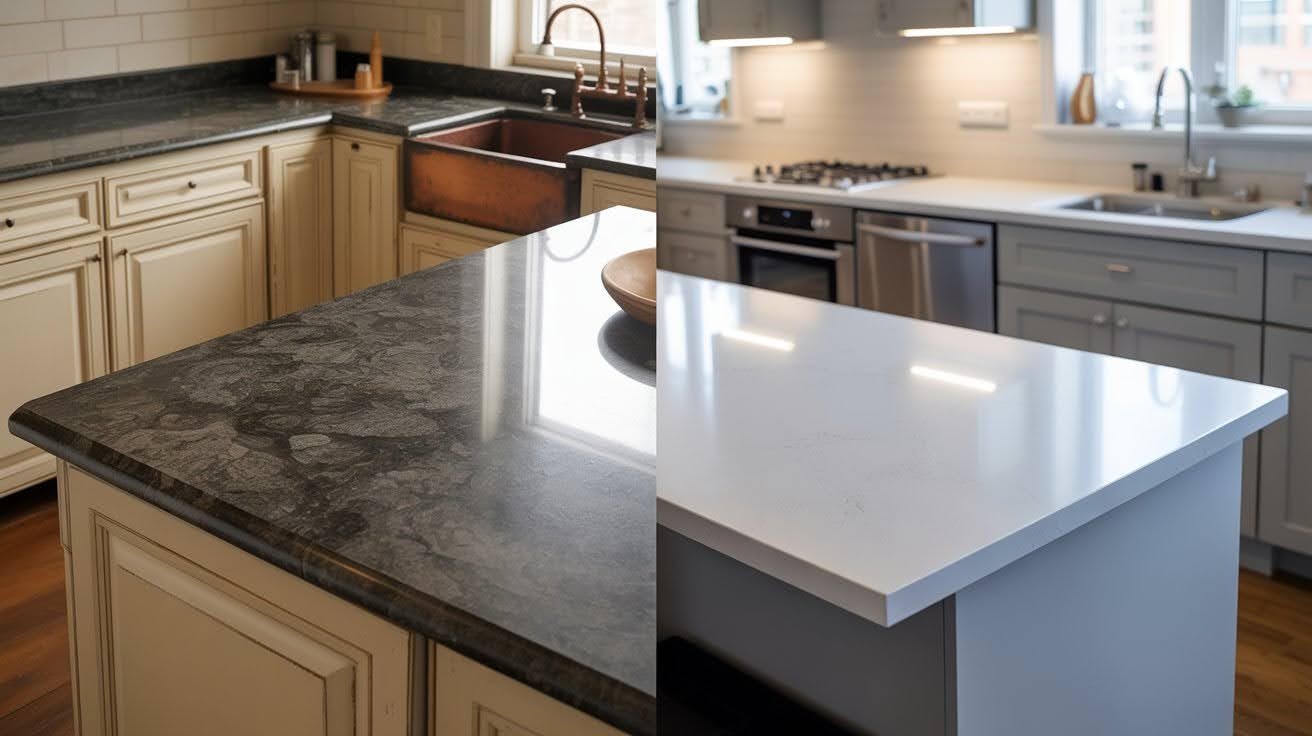For many, the choice between granite and quartz countertops comes down to price. I’ve spoken with hundreds of homeowners about which choice is better for their home, and “Is granite or quartz more expensive?” is always the first question. The answer isn’t straightforward.
In this guide, I’ll break down the costs. I’ll also break down how durable it is, how often it needs maintenance, what it looks like, and how well it resells.
You’ll see what goes into the cost and what’s ultimately more important in relation to the cost itself. Know your budget.
Know your own lifestyle needs. Know which countertop is the best fit for your kitchen.
What is Granite?
Granite brings natural beauty and durability from the earth directly into your kitchen spaces.
Composition and Natural Formation
Granite is a 100% natural stone that is quarried from the earth and polished into slabs. Each piece forms over millions of years through intense heat and pressure deep underground.
The colors and patterns depend entirely on where the stone comes from. Brazilian granite looks different from Italian or American quarries because of its distinct mineral combinations.
Appearance and Design Options
Natural variations make each granite slab completely one-of-a-kind. No two countertops will ever match exactly, giving your kitchen a truly unique look.
Colors typically fall into earth tones like browns, blacks, and tans. You’ll also find dramatic reds, deep greens, and striking blues depending on the stone’s origin.
Pros and Cons of Granite
Pros:
- Resists heat beautifully, so hot pans won’t damage the surface
- Highly durable and stands up to daily kitchen use
- Adds real property value to your home
- Natural beauty appeals to buyers who want authentic stone
Cons:
- Porous and needs annual sealing to prevent stains and bacterial growth
- Repairs are harder than quartz because you can’t easily hide damage
- The color palette is limited to what nature provides
What is Quartz?
Quartz countertops combine natural minerals with modern engineering for consistent, low-maintenance surfaces.
Composition and Manufacturing
Quartz is an engineered stone made from crushed natural quartz mixed with polymer resin and pigments. The mixture typically contains about 90-95% natural quartz particles.
Manufacturing creates a non-porous surface with uniform color and pattern throughout. This controlled process eliminates the natural variations found in granite slabs.
Appearance and Design Options
Quartz offers a wide range of colors that go far beyond what nature creates alone. Manufacturers can produce nearly any shade from pure white to deep black.
The material can mimic natural stone like marble or granite quite convincingly. Patterns remain more consistent across slabs, and light creates interesting depth in the surface.
Pros and Cons of Quartz
Pros:
- Requires minimal maintenance with no sealing needed ever
- Resists scratches and stains better than most natural stones
- Uniform patterns make it easier to match multiple slabs
Cons:
- Heat sensitivity is the biggest drawback, as hot pans can discolor or crack the surface
- Some people find the engineered look less appealing than natural stone
- Extended sun exposure may cause yellowing over time
Cost Comparison: Granite vs. Quartz
Understanding the full price picture helps you budget accurately and compare true value between materials.
|
Cost Factor |
Granite |
Quartz |
|
Budget Material Cost |
~$30 per square foot |
~$50 per square foot |
|
Premium Material Cost |
~$175 per square foot |
~$200 per square foot |
|
Installation Requirements |
Professional installation required |
Professional installation required |
|
Average Total Project Cost |
$4,500 (range: $1,500-$12,000) |
$4,500 (range: $1,500-$12,000) |
|
Color Availability |
Limited to natural variations |
Wide range of engineered colors |
|
Rare Color Pricing |
Significantly higher for exotic patterns |
Premium pricing for designer colors |
|
Import Factors |
Italian and Brazilian stones cost more |
Tariffs on imports increase prices |
|
Price Advantage |
Generally cheaper at the entry level |
More expensive at the budget tier |
|
Premium Tier Difference |
Slightly less expensive |
Slightly more expensive |
Durability and Maintenance
How well your countertops hold up to daily use determines whether the initial investment pays off long-term.
Granite Durability
Granite handles heat exceptionally well, so you can set hot pots directly on the surface without damage. The stone resists scratches and chips from normal kitchen use.
Annual sealing is required to maintain the protective barrier against stains and bacteria. This maintenance takes time and adds to long-term ownership costs.
Quartz Durability
Quartz resists scratches, chips, and stains better than most countertop materials. The engineered surface stays consistent over years of use.
The non-porous structure means zero sealing is ever required. Just wipe with soap and water for daily cleaning.
High heat sensitivity is the main weakness. Prolonged contact with hot objects can discolor or crack the resin. Quartz works best indoors away from direct sunlight.
Appearance and Aesthetic Considerations
Granite delivers a natural, authentic look that feels high-end and unique. Each slab tells its own geological story through color variations and mineral patterns.
Natural stone appeals to homeowners who value organic materials.
Quartz offers uniform patterns and customizable colors that fit modern design preferences. The engineered process allows for a consistent appearance across multiple slabs. Contemporary kitchens often benefit from this predictability.
Choose based on your kitchen style and personal taste. Traditional spaces often pair better with granite’s natural character.
Modern or minimalist designs frequently work better with quartz’s clean uniformity.
Environmental Impact
Countertop materials affect the environment differently, which matters to eco-conscious homeowners.
Granite is natural and biodegradable, returning to the earth eventually. However, quarrying impacts the land, transport requires significant fuel, and sealants may contain chemicals that affect indoor air quality.
Quartz is man-made and non-biodegradable, meaning it won’t break down naturally. The manufacturing process uses energy and produces waste, and some products may contain chemicals in the resin binders.
For eco-conscious buyers, choose low-VOC sealants for granite and ask about sustainable manufacturing for quartz.
Look for plant-based, biodegradable cleaners for both materials.
Resale and Long-Term Value
Your countertop choice affects home value when it’s time to sell, making this more than a personal decision.
Both granite and quartz can increase home value when installed properly. Quality countertops signal an updated, well-maintained kitchen to potential buyers.
Proper care preserves your investment over decades of use. Following maintenance guidelines keeps either material looking new and functioning well.
Quartz may require less maintenance effort over time, appealing to busy homeowners. Granite attracts buyers specifically seeking natural stone and authentic materials. Both choices can pay off depending on your local market and buyer preferences.
Conclusion
Quartz costs more. Granite has pores and needs a sealant. Both endure and offer aesthetic value for a bonus.
I’ve installed both in my own houses over the years, and you need to think about how you use your kitchen. Do you cook with lots of hot pans? Want low maintenance? Appreciate natural uniqueness?
Visit local showrooms with granite and quartzite samples. Check out the products, compare colors, and ask about pricing in person. I will help you decide after you drop me a comment.
Frequently Asked Questions
Which is cheaper, granite or quartz?
Granite is generally cheaper at the entry level, starting around $30 per square foot versus $50 for quartz. However, premium versions of both materials cost similarly at the high end.
Does quartz scratch more easily than granite?
No, quartz actually resists scratches better than granite due to its engineered composition. Both materials handle normal kitchen use well, but quartz has a slight edge in scratch resistance.
Can you put hot pans on granite and quartz?
You can safely place hot pans on granite without damage. Quartz is more heat-sensitive and can discolor or crack from prolonged heat contact, so use trivets.
Which countertop material lasts longer?
Both granite and quartz can last 25+ years with proper care. Quartz requires less maintenance over time, while granite needs annual sealing to maintain its protective barrier.
Does granite or quartz add more home value?
Both materials add similar value to homes when properly installed and maintained. Buyer preference varies by region, with some markets favoring natural stone and others preferring engineered materials.

